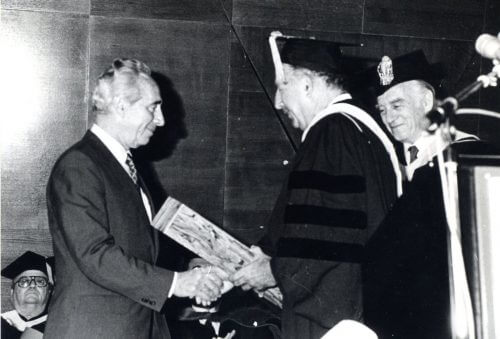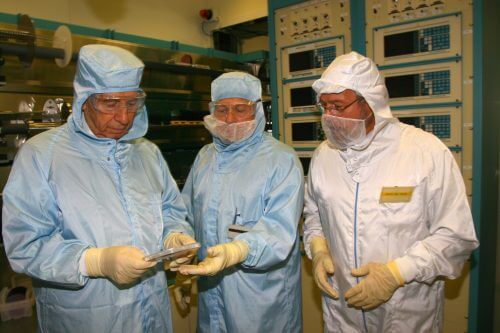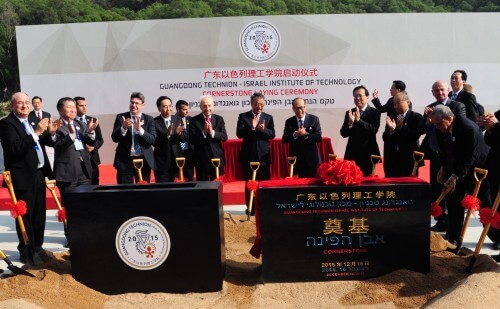In an interview with the Hidan website in 2003, Peres said in praise of nanotechnology: "We have gone down another floor in the basement of creation." Initiated and founded projects in the field of scientific education

"Not only Ilan Ramon discovered space, but space discovered Ilan. Lulia took off, we didn't know we had such a person." Former Prime Minister and later President Shimon Peres eulogized Ilan Ramon In the only interview he conducted with the site of knowledge in 2003, shortly after the disaster. Shimon Peres died yesterday after being hospitalized for about two weeks due to a stroke he suffered.
At least in the last few decades, Peres has been the spokesperson for Israeli science in the world. In that interview, he mainly referred to the field he promoted at the time - nanotechnology. "We have now discovered a new level of matter - nanotechnology. We simply went down another floor into one of the basements of creation and it turns out that it will change our lives, because until now everything we have done has been done from visible things when the world is built from invisible things. This world contains greater wealth than new metals, new strategies, new sciences and also economy in quantity, in energy. The possibility to penetrate places we could not penetrate before."
"Nanotechnology is the positive part of the nuclear bomb. In a nuclear bomb, two hemispheres collide at breakneck speed and then suddenly high energy is released. A nuclear bomb that weighs seven kilograms can destroy an entire world.
"Why does this happen, because it causes a chain collision between atoms that have a fixed order. If you can make a combination of atoms in an orderly way, you can also acquire tremendous building power. In order to collide, you don't need to see the atom, it's enough to imagine it. To build you also need to control it. Three or four years ago, they managed to build microscopes that would allow viewing it and discovered that it is a cell full of power and capable of indescribable changes and flexibility, and that is why they are now starting to investigate."
"This gives a tremendous potential, for example the metal of the atom is a hundred times stronger than steel and needs the hundredth part of the energy to build it. For example, you can build a tank out of foil, cars out of foil. It is possible to minimize in an incredible way - a computer the size of a pinhead. The entire Hebrew encyclopedia on a pin. In a grain of dust."
"You can create invisible engines. Robots which is the 800th part of a human hair. This robot can enter the human body without having to open the body. He can tour the human body and fix many things. It can deal with cancer cells. It also makes it possible to connect biology with electronics. One of the studies talks about artificial body parts such as an amputated hand that will be activated by the body's nervous system. New textiles can be made that will regulate heat and cold automatically - warming you when it's cold and cooling you when it's hot. The computers will also report the blood flow, pulse speed. Any malfunction in the body."
How long will it take until these things are opened? Isn't this basic science?
Peres: "There are already some things that are on the verge of being used. We can reach a situation where there will be armies without soldiers. Everything will be so tiny. Also the field of robots that will be inside the human body. Some things are already starting to come into use. In the field of chips - nano, which is the billionth part of a meter, the smallest unit created so far is one hundred nanometers. Intel has now developed a chip that works at 70 nm. When they get to one nano, you won't see the chip except with a highly sophisticated microscope. can reach invisible devices. A computer the size of a butterfly that will be more powerful than today's computers. They are working on it all over the world and I want Israel to enter it as soon as possible and with the greatest momentum."
In a panel with three Nobel laureates in chemistry, Professors Avraham Hershko, Aharon Chachanover and Danny Shechtman, in 2014 the president told that David Ben-Gurion once asked him to form a soccer team that would be the world champion. "I didn't succeed, but the Technion can really be the champion of the Technions in the world," he said. "Ben Gurion was a big dreamer and allowed me to dream too," he added. "I am proud of the Technion. Science is our existential need. The world today is barely surviving, countries around us are falling apart. The future is in innovation, but if you don't find a way to control the fanatics or make them control themselves - the world will be a dangerous place. The State of Israel should also build relationships with large global companies, not only with countries. We are a small country in terms of territory and we have no choice but to be big in vision."
At a conference at the Hebrew University in March 2014 He already marks the next destination - brain research:
"We can take an example from the tremendous success that the State of Israel had with nanotechnology - every shekel that the State of Israel invested in the research and development of nanotechnology returned many times over. Now it is the turn of the Israeli brain revolution. The European Union and the United States also understand this and invest billions in brain research. The State of Israel may be small in resources but large in talent - we excel in brain research and the relationship between the brain and the computer. Human wisdom combined with punctuality and the speed of the brain can save lives and heal patients, I believe that if we invest in brain research within ten years we will live in a completely different world."
Even after his retirement from the position of President, he continued to represent Israeli science in Israel and around the world. Here are things who said at the ceremony for the establishment of the Technion branch in China less than a year ago (December 2015):
The ninth President Shimon Peres, who was one of the main guests of honor at the ceremony, said that "the establishment of the Technion branch in China is further proof that Israeli innovation is breaking ground and crossing geographical borders. China is one of Israel's main partners in the field of technology and high-tech. Today, over 1,000 Israeli companies operate in China, and I hope that the economic cooperation between the countries will only deepen. The two countries have a lot to share and learn from each other."
One of his last campaigns was entering at the age of over ninety the role of a student who was considered a troublemaker and in the end he turned out to be a mathematical genius in a journey organized by the Ministry of Education led by the minister Naftali Bennett for encouraging the study of 5 math units.

"The State of Israel has been blessed with talents capable of reaching unexpected heights, but they must be nurtured. We must not put up with a situation where in the State of Israel, children who can study five matriculation units in the schools will not do so due to a lack of means. A financial deficit can be corrected later - an educational deficit cannot be corrected."
"Israel is the symbol of the start-up nation, but never resilience! Start Up Nation is not a one-time move - you cannot buy scientific excellence once and that's enough. In order for us to stand up to the global competition in front of the international markets, the state must invest the most, to allow its students first class science. The subjects of science and technology rely on mathematics, therefore, the advancement of studies and a vigorous pursuit of scientific excellence are an existential necessity and a supreme interest for the future of Israel."
The Technion stated that: "The late Shimon Peres has always believed in the importance of science and technology for the development of the State of Israel and its resilience, and for this he was awarded an honorary doctorate from the Technion in 1985."
"As part of the special relationship he forged with the Technion family, Peres visited the Technion many times, including the ceremony of laying the cornerstone for the Sara and Moshe Zisafel Center for Nanoelectronics (2003) and the signing of the agreement for academic cooperation between the Technion and the French École Polytechnique (2013). Last year, Peres honored the Technion by participating in the cornerstone laying ceremony for the Guangdong-Technion-Israel Institute of Technology (GTIIT).
Technion President Prof. Peretz Lavi eulogized him: "Shimon Peres, the ninth president of the State of Israel, honorary doctor of the Technion and a true friend, passed away this morning. As a man of vision, Shimon Peres believed in the power of technology to change human reality.
In a letter he sent me in 2013, he wrote that 'Technion researchers and scientists, including many talented young people, contribute to Israel's positioning as an original and daring global laboratory at the forefront of scientific development in the entire world. There is no limit to your breakthrough innovation. You are the guarantee for the preservation of the quality advantage of the State of Israel in the future.'
He was a unique person, with optimism and vision, who believed in the power of engineering and science to advance humanity towards a better future. He supported the development of nanotechnology research and even laid the cornerstone for the Sara and Moshe Zisafel Center for Nanoelectronics at the Technion. Nano research, which was then a new and pioneering field, is now a central activity in the life of the Technion.
Peres loved visiting the Technion, and was always thrilled by the level of scientific research and technological innovations. A year ago, he agreed to honor the Technion by participating in the cornerstone laying ceremony for the Guangdong-Technion-Israel Institute of Technology (GTIIT) in China - an initiative that testified to his perception of Israeli innovation that transcends geographical boundaries.
Today we lost a dear man, a true friend and mentor. Of blessed memory. "

Among the many scientific-educational enterprises, a project stands outScientists and inventors of the future", which was initiated by Peres in 2008.
